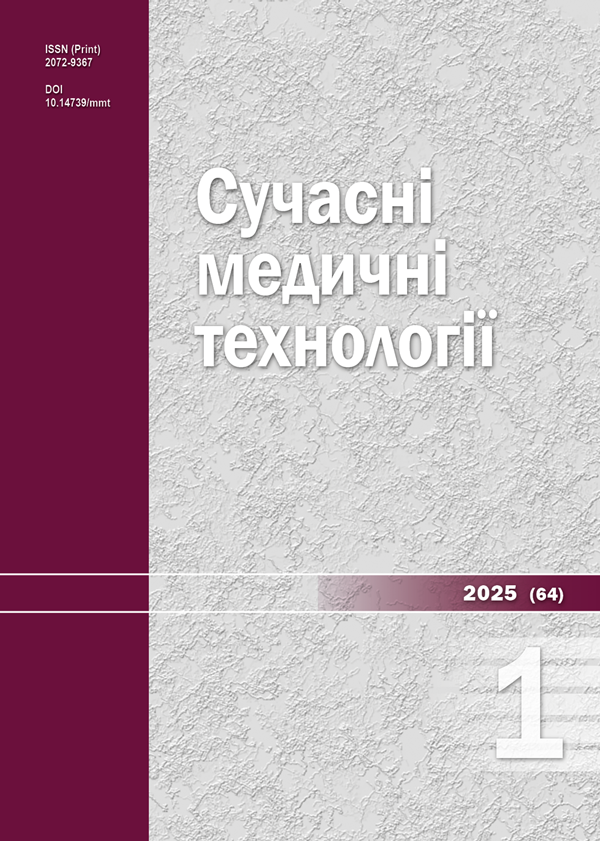Safety and efficacy of apixaban in patients with glomerulonephritis and nephrotic syndrome: a prospective longitudinal cohort study
DOI:
https://doi.org/10.14739/mmt.2025.1.320766Keywords:
apixaban, nephrotic syndrome, glomerulonephritis, thromboembolism, anticoagulation, warfarin, bleeding complicationsAbstract
Aim. Assessment of the efficacy and safety of apixaban in preventing thromboembolic complications in patients with nephrotic syndrome caused by primary glomerulonephritis.
Materials and methods. We conducted a prospective longitudinal cohort study involving 125 patients with glomerulonephritis and nephrotic syndrome. According to the inclusion criteria, patients had to be over 18 years of age, diagnosed with nephrotic syndrome within the last month, and have an estimated glomerular filtration rate greater than 60 ml/min/1.73 m². The study population was divided into two cohorts for comparison: one group (62 patients) received prophylactic anticoagulation with warfarin, while the other group (63 patients) was administered apixaban at a dose of 5 mg twice daily. The observation period was 6 months.
Results. During the observation period, no thromboembolic events were reported in either group, indicating the effectiveness of both treatments. However, minor bleeding events were significantly more frequent in the warfarin group than in the apixaban group (p = 0.003). These findings suggest that apixaban is associated with a lower risk of bleeding while maintaining effective thromboembolic prevention.
Conclusions. This study highlights that apixaban is a potentially better alternative to warfarin for thromboprophylaxis in patients with nephrotic syndrome and glomerulonephritis, particularly in those at high thromboembolic risk. Further randomized controlled trials are recommended to confirm these findings and optimize anticoagulation strategies for this population.
References
Dudar I, Mykhaloiko I. [The role of hemostatic disorders in the progression of chronic kidney disease]. Ukrainian Journal of Nephrology and Dialysis. 2019;4(64):49-55. Ukrainian. doi: https://doi.org/10.31450/ukrjnd.4(64).2019.07
Nissar SM, Kuchay AA, Mir TH, Goud LN, Latief M. Direct Oral Anticoagulants in Nephrotic Syndrome: Our Experience and Literature Review. Indian J Nephrol. 2024;34(2):169-71. doi: https://doi.org/10.4103/ijn.ijn_317_22
Su X, Yan B, Wang L, Cheng H, Chen Y. Comparative efficacy and safety of oral anticoagulants for the treatment of venous thromboembolism in patients with different renal functions: a systematic review, pairwise and network meta-analysis. BMJ Open. 2022;12(2):e048619. doi: https://doi.org/10.1136/bmjopen-2021-048619
Tian Y, Sun B, Sun G. Research progress of nephrotic syndrome accompanied by thromboembolism. Int Urol Nephrol. 2023;55(7):1735-45. doi: https://doi.org/10.1007/s11255-023-03474-8
Thummala AR, Morad T, Lees C, Cantor EE. Diagnostic Challenges in Nephrotic Syndrome Presenting With Venous Thromboembolism. Cureus. 2024;16(10):e71173. doi: https://doi.org/10.7759/cureus.71173
Kidney Disease: Improving Global Outcomes (KDIGO) Glomerular Diseases Work Group. KDIGO 2021 clinical practice guideline for the management of glomerular diseases. Kidney Int. 2021;100:S1-S276. doi: https://doi.org/10.1016/j.kint.2021.05.021
De Pascali F, Brunini F, Rombolà G, Squizzato A. Efficacy and safety of prophylactic anticoagulation in patients with primary nephrotic syndrome: a systematic review and meta-analysis. Intern Med J. 2024;54(2):214-23. doi: https://doi.org/10.1111/imj.16227
Dudar I, Mykhaloiko I. [Anticoagulant and antiplatelet therapy for chronic kidney disease patients]. Ukrainian Journal of Nephrology and Dialysis. 2020;2(66):40-6. Ukrainian. Available from: https://ukrjnd.com.ua/index.php/journal/article/view/409
Ageno W, Caramelli B, Donadini MP, Girardi L, Riva N. Changes in the landscape of anticoagulation: a focus on direct oral anticoagulants. Lancet Haematol. 2024;11(12):e938-50. doi: https://doi.org/10.1016/S2352-3026(24)00281-3
Derebail VK, Greenberg KR, Anderson AM, Stearman K, Ginsberg LJ, Falk RJ. Pharmacokinetics and pharmacodynamics of apixaban in nephrotic syndrome: findings from a phase 1a trial. Am J Kidney Dis. 2023;81(3):373-6. doi: https://doi.org/10.1053/j.ajkd.2022.09.011
Laslandes M, Connault J, Nicolet L, Ternisien C, Gregoire M, Ville S, et al. Monitoring the activity of direct oral anticoagulants in a patient with severe nephrotic syndrome and pulmonary embolism. Lessons for the clinical nephrologist. J Nephrol. 2023;36(1):237-9. doi: https://doi.org/10.1007/s40620-022-01406-w
Lin R, McDonald G, Jolly T, Batten A, Chacko B. A systematic review of prophylactic anticoagulation in nephrotic syndrome. Kidney Int Rep. 2019;5(4):435-47. doi: https://doi.org/10.1016/j.ekir.2019.12.001
Tham D, Zhao L, Yu W, Kherani J, Kou R, Li A, et al. Safety and efficacy of direct oral anticoagulants in chronic kidney disease: a meta-analysis. Res Pract Thromb Haemost. 2024;8(7):102584. doi: https://doi.org/10.1016/j.rpth.2024.102584
Kelddal S, Nykjær KM, Gregersen JW, Birn H. Prophylactic anticoagulation in nephrotic syndrome prevents thromboembolic complications. BMC Nephrol. 2019;20(1):139. doi: https://doi.org/10.1186/s12882-019-1336-8
Tijani A, Coons EM, Mizuki B, Dermady M, Stanilova K, Casey AL, et al. Direct Oral Anticoagulants Versus Warfarin for Venous Thromboembolism Prophylaxis in Patients With Nephrotic Syndrome: A Retrospective Cohort Study. Ann Pharmacother. 2023;57(7):787-94. doi: https://doi.org/10.1177/10600280221129348
Lip GY, Keshishian A, Li X, Hamilton M, Masseria C, Gupta K, et al. Effectiveness and safety of oral anticoagulants among nonvalvular atrial fibrillation patients: The ARISTOPHANES study. Stroke. 2018;49:2933-44. doi: https://doi.org/10.1161/STROKEAHA.118.020232
Van Meerhaeghe T, Cez A, Dahan K, Esteve E, Elalamy I, Boffa JJ, et al. Apixaban Prophylactic Anticoagulation in Patients with Nephrotic Syndrome. TH Open. 2022;6(4):e299-e303. doi: https://doi.org/10.1055/a-1920-6224
Sexton DJ, de Freitas DG, Little MA, McHugh T, Magee C, Conlon PJ, et al. Direct-Acting Oral Anticoagulants as Prophylaxis Against Thromboembolism in the Nephrotic Syndrome. Kidney Int Rep. 2018;3(4):784-93. doi: https://doi.org/10.1016/j.ekir.2018.02.010
Mykhaloiko I, Yatsyshyn R, Dudar I, Kuryliv H. Evaluation of the level of antithrombin in patients with glomerulonephritis and nephrotic syndrome: A cross-sectional study. Ukrainian Journal of Nephrology and Dialysis. 2024;4(84):57-64. doi: https://doi.org/10.31450/ukrjnd.4(84).2024.07
Wei M, Wu X, Wang L, Gu Z, Tu Y, Zhang L, et al. Rivaroxaban for Thromboembolism Prophylaxis in Patients with Nephrotic Syndrome: A Single-Arm, Prospective Study. Kidney Dis (Basel). 2024;10(5):346-58. doi: https://doi.org/10.1159/000540107
Downloads
Additional Files
Published
How to Cite
Issue
Section
License
Copyright (c) 2025 Mykhaloiko I. S., Yatsyshyn R. I., Dudar I. O., Hotsaniuk O. I., Kuryliv H. M.

This work is licensed under a Creative Commons Attribution-NonCommercial 4.0 International License.
The work is provided under the terms of the Public Offer and of Creative Commons Attribution-NonCommercial 4.0 International (CC BY-NC 4.0). This license allows an unlimited number of persons to reproduce and share the Licensed Material in all media and formats. Any use of the Licensed Material shall contain an identification of its Creator(s) and must be for non-commercial purposes only.














